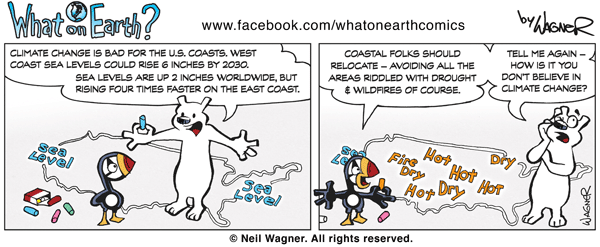
The NOAA recently determined that the May 2011-April 2012 timeframe was the warmest 12 month period on record for the contiguous U.S., as Bebbo and Kito recently discussed. But pity that poor timeframe, because it has already been eclipsed by July 2011-June 2012.
But those two timeframes have a common bond. A shared custody, if you will: January-June, 2012 is the warmest first-half-year on record for the lower 48.
How does this kind of warming -- and subsequent climate change -- appear to us as we go about our daily lives? On most days, my morning routine is a simple one: (A) Go to gym, (B) Jam in my ear buds, (C) Run on a treadmill before an array of TV screens showing newscasts that look like something from an overblown disaster movie:
- The sea level along the U.S. Atlantic coast neighboring New York, Norfolk and Boston is rising up to four times faster than the global average.
- Sea level by California is expected to rise 6 inches by 2030, 4 inches for the rest of the West Coast
- This year's drought has been declared the biggest-ever natural disaster in American history. Yes, you read that correctly.
- This June's Arctic sea ice melt (equaling the areas of Alaska, California, Florida, and Texas combined) is more than in any June on record.
- From Montana to New Mexico, record-setting wildfires have destroyed 1,000 homes. Colorado's Waldo Canyon fire has eclipsed this summer's High Park Fire as the state's most destructive.
- The Greenland ice sheet is likely to have another record melt this year -- one that will cover the sheet's entire surface for the first time in recorded history.
- Large swaths of the U.S. were recently hit by Derecho events -- widespread, long-lived wind storms associated with a band of rapidly moving showers or thunderstorms. "Over 30 thunderstorms with wind gusts of 80 miles per hour. ... It's kind of the equivalent to having 30-plus weak tornadoes on the ground."
- Recent statistics show that 6,439 warm temp records have been set or tied in the Lower 48 states so far this year.
That all sounds pretty unusual to me. Apparently iconic, professorial pundit George Will doesn't agree, having recently said of the U.S. heat wave:
"How do we explain the heat? One word: summer. I grew up in central Illinois in a house without air conditioning. What is so unusual about this?"
We all like to think that when we were growing up the hots were hotter, the colds were colder, and the walks to school longer (and uphill both ways as Bill Cosby has noted). But sometimes that just isn't the case. I reviewed the summer temperatures of Mr. Will's youth in Champaign, Illinois (through age 20), and found there have been almost as many 100 degree days (6) this summer so far as there were in all of Will's first 20 summers (a total of 7).
Unusual is defined as "not usual, common, or ordinary; uncommon in amount or degree." I'd say our climate's behavior is unusual, as is George Will's perception of it.
Like "What on Earth?" on Facebook.
Become a Fan here at The Huffington Post.